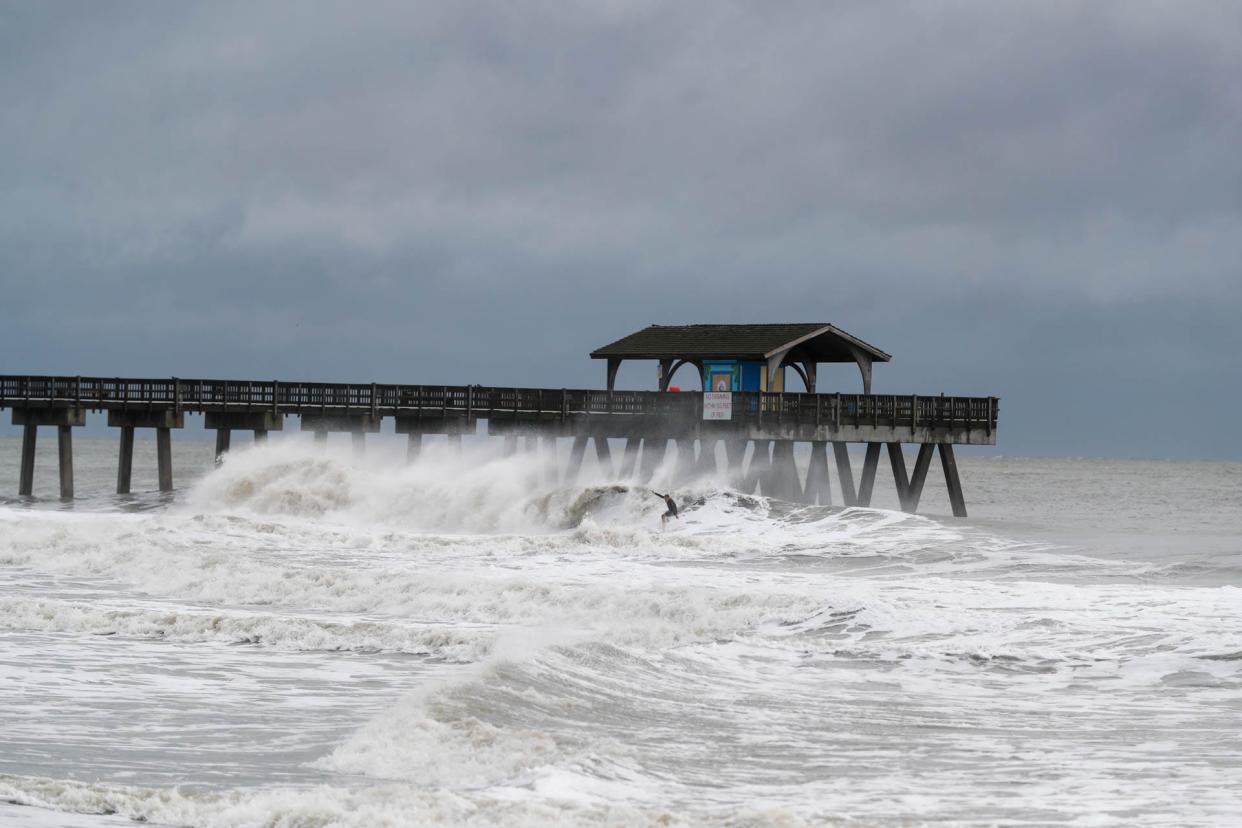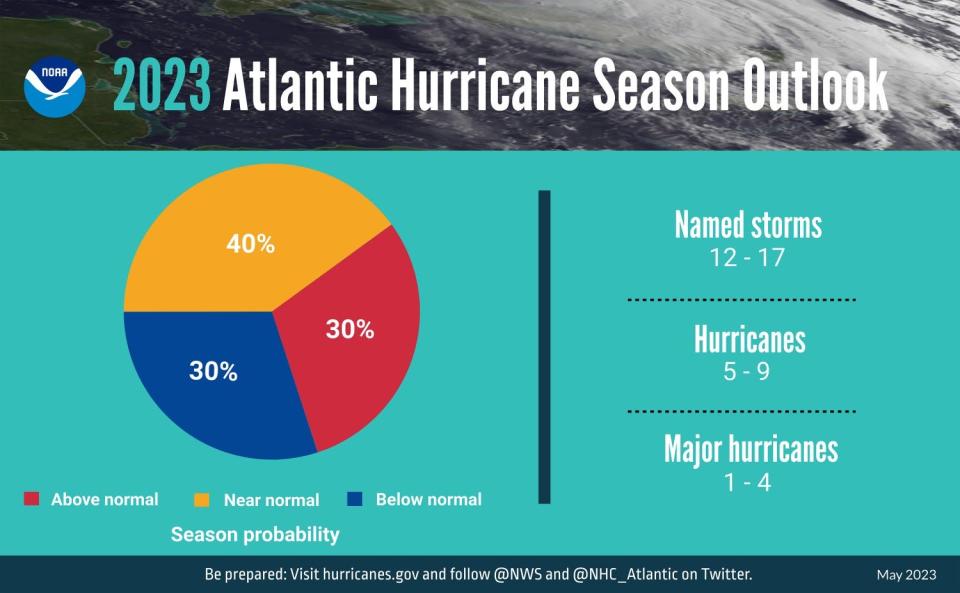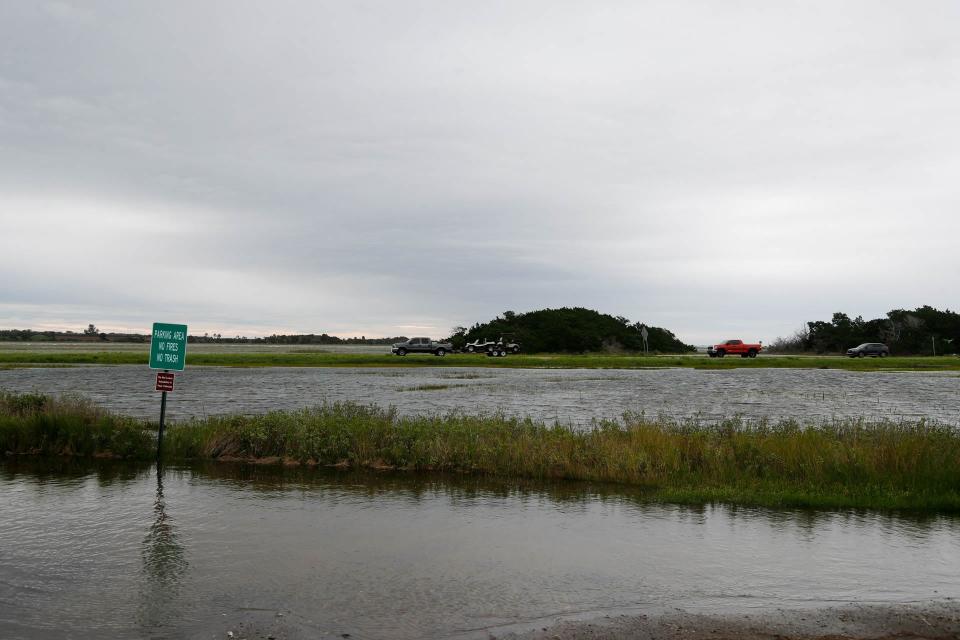NOAA announces 2023 hurricane forecast. What is in store for Georgia?

The National Oceanographic and Atmospheric Administration announced the forecast for the 2023 Atlantic hurricane season Thursday and is forecasting a near-normal season.
The official hurricane season stretches from June 1 until Nov. 30, and for southeastern states like Georgia, the latter half of the season tends to be more active.
NOAA is forecasting a range of 12 to 17 named storms (winds of 39 mph or higher). Of those, five to nine could become hurricanes (winds of 74 mph or higher), and one to four of those are predicted to be major hurricanes (category 3, 4 or 5; with winds of 111 mph or higher).

More on the season: Hurricane outlook for 2023: NOAA announces prediction for how many hurricanes will form
After busy years, a slowdown ahead
This year could be a slowdown after some busy hurricane seasons according to Bill Murphey, Georgia's state climatologist and chief meteorologist for the Georgia Department of Natural Resources and Environmental Protection Division. He and his fellow climatologists keep the state and its government abreast of droughts, flooding events, severe weather episodes and other weather and climate phenomena impacting Georgia.
Since 2020, the Atlantic has been in a La Niña pattern, a weather pattern that changes wind shear over the ocean and generally removes barriers to storm formation in the Atlantic, making hurricanes more likely. But this year, Murphey said an El Niño is shaping up, during which hurricanes are less likely to form.
Explainer: Graphics: El Niño could return in 2023; what that means for the world's weather

But it's a bit more complicated than that. As NOAA's lead hurricane season forecaster Matthew Rosencrans explained in the agency's May 25 press conference, there's some uncertainty baked into the forecast this year. While the Atlantic is looking to have a moderate El Niño, there are very high Atlantic sea surface temperatures. Hurricanes use warm water as fuel to power storms, and recently the Atlantic has been much warmer than usual, which could counteract some of the hurricane suppression anticipated from the El Niño moving in.
Just because Georgia hasn't received a major hurricane on the coast in a couple of years doesn't mean storms haven't impacted the state, Murphey said. He and his office have been keeping track of all the major storm systems that enter Georgia, and specifically have looked at the number of storms that have entered Georgia that originated as tropical cyclones since 2012. Looking at that number, Murphey said they've seen an uptick since 2020.
More: 2023 Tropical Cycle Names
Recent years: Tropical Storm Ian: Georgia's seasonal high tides will cause flooding as storm comes ashore
In 2020 and 2021, Murphey said Georgia experienced four storms that began as tropical cyclones, and by the time they reached Georgia they were still more than regular storms: tropical storms, tropical depressions (wind speeds less than 39 mph), or low-end hurricanes.
Last year, the weather took advantage of the entire stretch of the season. On the very last day of the official 2022 Atlantic hurricane season, Nov. 30, 2022, both Hurricane Ian and Hurricane Nicole made landfall in Florida. While Hurricane Nicole arrived as a Category 1 storm, the least severe hurricane designation, Hurricane Ian made landfall as a Category 4. Florida bore the majority of the brunt of these storms, but Georgia received heavy rains and flooding as well that impacted communities.
Future look: Stronger storms, longer seasons: How hurricanes will change in Georgia's rising waters
On the island: Tybee prepares for long-term solutions to climate change, erosion, storms

Preparation is key
For coastal residents, Chatham Emergency Management Agency's (CEMA) emergency preparedness manager Chelsea Sawyer said putting in the leg work early to prepare for hurricane season is vital.
"Every family, every individual has a different preparedness story," Sawyer said. Preparing to be stuck inside at home or on the road can look different for single individuals versus families with infants, she said, so creating an emergency kit and preparedness plan fit for your household is important.
In her seventh hurricane season with the agency, Sawyer said she's seen the gamut in terms of preparedness. Her first year, Hurricane Matthew arrived and it was the first time Chatham County issued an evacuation order in more than 30 years. In 2019, she said Hurricane Dorian also brought an evacuation order but that there were some challenges with complacency.
Money matters: What Georgia residents need to know about flood insurance prices and why they need it
Natural flood barriers: UGA engineers launch new project to insure salt marshes for their environmental benefits
While some scoffed at the mandatory evacuation, Sawyer said that it all boiled down to timing and the tide: had the storm arrived six hours earlier or later, during high tide, it would have been some of the worst flooding Chatham County had ever seen. In areas like coastal Georgia, damage from storms like Matthew and Dorian can bring major debris and tree fall that can trap people inside their homes.
While this year looks to be a slower season, it only takes one storm to cause major damage in a community.
Sawyer said a distinction to remember during hurricane season is the difference between an evacuation and a mandatory evacuation order.
"An evacuation order is a general directive, urging and encouraging residents to evacuate the target area and a mandatory evacuation order is an executive directive requiring all residents, visitors, business owners anyone in the target area to evacuate," Sawyer said.
Emergency services are not mandated to respond during a mandatory evacuation ― Sawyer said the agencies may not respond if the risk is too large for responders.
Here's some of Sawyer's recommendations for preparation:
Stay informed: Residents can receive emergency alerts from CEMA, news apps, social media and FEMA's wireless emergency alerts.
Emergency kit fit for you: Aside from having nonperishable foods and potable water at home for at least three to five days, also consider any medications that may need to be packed or obtained ahead of time and backup chargers or batteries to stay in touch via phone or hand-cranked radio.
Make a plan: Consider evacuation protocols and make a plan with your household agreeing what is the trigger point at which you will evacuate and where you will go.
Consider finances: Homeowner's insurance does not cover flooding, and FEMA may not pay as much money is needed for families to get back on their feet after a disaster. Especially for coastal residents, the best time to reevaluate insurance is before the weather arrives.
Read more about hurricane preparedness at www.noaa.gov/hurricane-prep or at www.chathamemergency.org/PrepareNow/HurricanePreparedness.
This article originally appeared on Savannah Morning News: NOAA announces 2023 hurricane season, near-normal season el Nino

